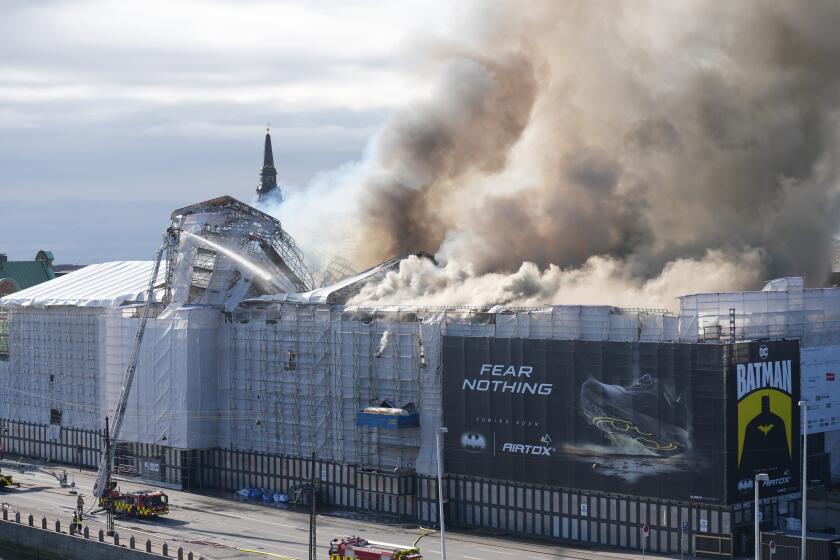Another death sentence for Iraq’s ‘Chemical Ali’
It’s a sentence that Saddam Hussein’s notorious cousin, known as “Chemical Ali,” is used to hearing, and Monday he heard it for the third time: death by hanging, for a 1999 crackdown on Shiite Muslims by the Sunni Arab-dominated regime.
Chemical Ali, whose real name is Ali Hassan Majid, also had been convicted and sentenced to death for the killings of tens of thousands of Kurds in northern Iraq in the late 1980s, and for a 1991 crackdown on Shiites in southern Iraq.
Monday’s execution order seemed routine to both judge and defendant in the courtroom of the Iraqi High Tribunal, which is hearing Hussein-era cases. Majid stood droopy-eyed in the defendant’s wooden enclosure, a gray mustache shadowing his small, down-turned mouth. The judge announced the guilty verdict and sentence, then tersely rapped his red folder on the desk as if straightening a deck of cards.
“Thank you, thank you again,” Majid said sarcastically as the judge walked out.
Another high-profile defendant, Tariq Aziz, the former foreign minister and then-deputy prime minister, was acquitted in the case, which stems from the Feb. 19, 1999, death of Ayatollah Mohammed Sadeq Sadr, a leading voice of opposition to President Saddam Hussein. Government agents allegedly were the killers of the Shiite cleric and two of his sons. A surviving son, cleric Muqtada Sadr, has emerged as the most prominent Shiite opponent of the U.S. presence in Iraq.
The Sadr assassination was followed by raids on Shiite strongholds to prevent his followers from gathering to protest his death. Dozens were killed and their homes destroyed.
The judge declared the evidence against Aziz insufficient. With Hussein rarely traveling abroad because of security concerns, Aziz, with his thick white hair and large, thick-rimmed glasses, was the face of Iraq in the outside world. Two other defendants were found guilty.
Iraq’s premier legal scholar, constitutional attorney Tariq Harb, said the finding was a promising sign for the government-appointed tribunal, which has been accused of bias against Sunni Arabs and others associated with Hussein. The allegations have come from international groups such as Human Rights Watch as well as Sunni politicians. Last year Sunni lawmakers demanded that the tribunal be closed.
“The verdict today only proves that the Iraqi special court is neutral, non-political, and constitutional. All the accusations made against the Iraqi judicial system are fraud,” Harb said.
Aziz still faces charges in another case; a verdict is expected March 11. It involves the execution of 42 Baghdad merchants in 1992 accused of price-gouging after international sanctions were imposed on Iraq. Aziz could be sentenced to death if convicted of signing the death warrants.
Aziz and Majid have said the charges against them are politically motivated.
Majid’s fate remains in limbo despite his growing collection of death sentences. He was scheduled for execution early last year for the mass killings of Kurds, in which government aircraft dumped mustard and nerve gas on thousands. But when the execution of two co-defendants was postponed by political wrangling, so was Majid’s. The dispute has not been resolved.
Majid received his second death sentence in December. He has yet to stand trial in other unrelated cases.
Those convicted Monday in addition to Majid were Mahmood Faizi Hazaa, a former intelligence official, and Aziz Saleh Numan, who served as a top official in the ruling Baath Party under Hussein.
Also Monday, former Iranian President Hashemi Rafsanjani arrived in Iraq for an official visit. Iran has sought to strengthen ties with Iraq, which U.S. officials have increasingly conceded is to be expected given the countries’ lengthy shared border.
The United States has long accused Iran of aiding Shiite militias that attack U.S. and Iraqi forces and of allowing bombs and supplies to flow across the border. Iran has denied the accusations. With violence at its lowest level since the U.S.-led invasion in March 2003, the allegations have quieted, though American officials remain skeptical of Iranian intentions.
Rafsanjani is considered a moderate among Iran’s political and religious leaders and has suggested that U.S.-Iranian relations could improve under President Obama if he avoids the hawkish rhetoric of the Bush administration.
In Baghdad, the U.S. military said a soldier was killed while on patrol north of the capital. At least 4,254 U.S. troops have died in Iraq since the start of the war, according to icasualties.org.
--
Times special correspondents in Baqubah and Baghdad contributed to this report.
More to Read
Start your day right
Sign up for Essential California for news, features and recommendations from the L.A. Times and beyond in your inbox six days a week.
You may occasionally receive promotional content from the Los Angeles Times.







